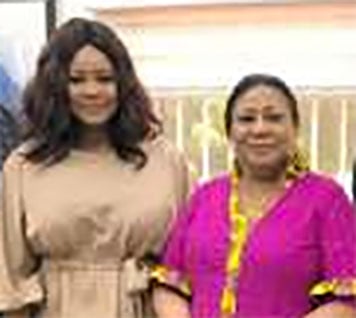Kafui Danku, Executive Secretary of the National Film Authority (NFA), publicly revealed her affiliation with the National Democratic Congress (NDC) just months before the 2024 general elections, a move that surprised some given her previous interactions with members of the opposing New Patriotic Party (NPP). This declaration marked a significant shift from her prior apolitical community engagement to a formal political stance. Danku explained that her decision wasn’t a sudden whim but rather a culmination of mounting frustrations with the then-governing NPP, prompting her to actively participate in the political landscape by aligning with the NDC. While she had previously engaged in philanthropic efforts, supporting local initiatives and community development, she felt compelled to take a more direct role in shaping the political future of Ghana. This decision marked a new chapter in her public life, transitioning from a primarily non-partisan figure to an openly declared member of a major political party.
Danku’s prior association with prominent NPP figures, including former First Lady Rebecca Akufo-Addo, had led many to believe she leaned towards the NPP. Photographs and public appearances alongside members of the then-ruling party fueled speculation about her political affiliations. These interactions, coupled with her silence on any explicit party allegiance, created an ambiguous image regarding her political leanings. However, Danku clarified that these engagements were not indicative of political alignment but rather part of her broader commitment to community development and collaboration with individuals across the political spectrum. Her meetings with figures like the former First Lady, she explained, were focused on shared goals of community upliftment and did not represent a political endorsement.
The actress and filmmaker clarified that her decision to join the NDC was deeply rooted in the party’s demonstrated commitment to inclusivity and the empowerment of women and youth in leadership positions. She highlighted the NDC’s active promotion of female representation in politics, a factor that resonated strongly with her. Danku emphasized that the party’s message of empowering young people and particularly women to take on leadership roles was a key driver in her decision to officially join their ranks. This aligned with her own personal advocacy for greater female participation in decision-making processes and her belief in the potential of young people to shape the future of the nation.
Danku’s decision to join the NDC underscores a broader trend of increasing political engagement among prominent figures in Ghana’s entertainment and arts sectors. Historically, many celebrities have shied away from overt political endorsements, opting to maintain a neutral stance to avoid alienating portions of their fan base. However, Danku’s move reflects a growing willingness among public figures to openly express their political beliefs and actively participate in the political process. This shift may signal a changing dynamic in Ghana’s political landscape, where the voices of artists and entertainers are increasingly recognized as influential in shaping public opinion and mobilizing support for political causes.
The public reaction to Danku’s announcement was varied, with some expressing surprise while others welcomed her decision. Supporters of the NDC lauded her choice, seeing it as a validation of the party’s inclusive policies and its appeal to a diverse demographic. Conversely, some critics questioned the timing of her announcement, suggesting it was strategically motivated by the upcoming elections. Others, particularly those aligned with the NPP, expressed disappointment, viewing her move as a betrayal of their perceived association. This range of reactions highlights the inherent complexities and potential divisiveness of political endorsements, especially from public figures with a wide following.
Despite the mixed reactions, Danku’s decision to formally join the NDC signifies a significant personal and political step. It marks a transition from a primarily community-focused approach to a more direct engagement with the political machinery of Ghana. Her decision underscores the power of political parties to attract individuals based on their values and policy platforms, particularly those focused on inclusivity and youth empowerment. Danku’s move also highlights the potential for public figures to leverage their platforms to advocate for political change and inspire greater civic participation. Her journey from community engagement to formal political affiliation serves as a case study in the evolving relationship between public figures, political parties, and the broader electorate in Ghana.














